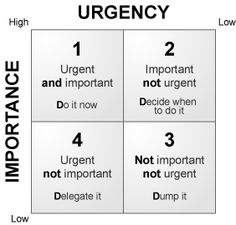Mar 14, 2017 | Planning & Goal Setting, Self, Time Management
Time – Can You Ever Get Enough?
Whether you own a business or work for someone who does, you have probably experienced the “never enough time” phenomenon. When I worked in the high-tech world, we never had enough time to do it right, but always plenty of time to go back and fix it later. This practice was also known as using the customers for beta testing.
If we want our businesses, and ourselves to thrive, then we must focus on two things: 1) doing the right things, and 2) doing things right. Stephen Covey, in his book “The 7 Habits of Highly Effective People” offers a powerful tool, the Urgency vs. Importance matrix to achieve both goals.
In this matrix, Quadrant 2, is a set of activities in a business, or your life, that are Not Urgent, but are Important. This quadrant is the Zone. The Zone is that place where you set aside all the busy work of the day and focus on the things that are truly important for your long-term success. These are activities like planning, strategy, learning and cultivating relationships.
So how do we get i n The Zone? First and foremost, you make a conscious decision to get there. It will not happen naturally, because these tasks are not urgent, they are not in your face demanding attention!
n The Zone? First and foremost, you make a conscious decision to get there. It will not happen naturally, because these tasks are not urgent, they are not in your face demanding attention!
When was the last time your most important client called you up and demanded that you get to work on your cash flow forecast? Probably never, but when was the last time a client complained that you didn’t have the right parts in stock, or that her order was a week late? Did you take the time to tell her that earlier this year you failed to budget for parts stock, or that you failed to plan to replace that aging equipment?
This is one of the hardest things for my clients to see. They are constantly in the “urgency” quadrant, specifically because they don’t spend enough time in the zone. Every day I hear about how overwhelmed they are, because of all the urgent daily demands. Getting in the Zone takes practice to become a habit. Here are some tips for how to do so.
-
Put it on your calendar on a regular basis
Scheduling time for planning activities is probably the best and maybe the only way to ensure that they get done. You should spend 20% of your time in Zone activities, but that doesn’t necessarily have to be weekly. It could be on a monthly or quarterly basis. One way is to allocate 4 hours per week to planning (medium-long term, not short-term), plus 8 hours per month, plus 16 hours per quarter, perhaps in an off-site session like GrowthClub.
-
Establish a system for accountability
Accountability will help you reinforce the need and the habit. It can be a coach, an accountability partner, a mastermind group, a partner, a spouse or anyone that you will feel accountable to for following through. Be sure that they know to ask you when and how you are allocating your time. Be sure that you have deliverables to them for the output of your planning, then review and discuss it with them. HINT: if you’re not willing to do this, you’re not committed to achieving the goal.
-
Break up the work and the time into proper-sized chunks
Some people work best in 30-45 minute bursts, other prefer 2 hour chunks of time. Pay attention to your own attention span and work style. Then allocate the most efficient periods of time for you to get your Zone work done. Break up the work into properly sized chunks so that you can accomplish something meaningful in each time period. Know yourself, and when you set aside your Zone time, make sure the chunks of time will be most effective for you.
-
Pick the right time of day for your Zone activities
In every business and for every person, there are times of day or days of the week that are better or worse than others. If you know that Monday mornings are always crazy, don’t allocate any Zone time for Mondays. You also know your own daily flow, so be sure to schedule your Zone time at a time of day that is best for the type of thinking you will be doing – creative out of the box brainstorming or detailed number-crunching.
If you want long-term success in your business and life, it takes this kind of intentional disciplined planning. Success rarely happens by mistake. Be sure that you are always planning for success, not just this week, but for the next decade.
If you want to really learn how to get into the Zone, come to my TimeWise workshop Friday March 17, 2016 11:30 – 1:30.
Jun 6, 2016 | Planning & Goal Setting, Self, Time Management
Time – Can You Ever Get Enough?
Whether you own a business or work for someone who does, you have probably experienced the “never enough time” phenomenon. When I worked in the high tech world, the saying was always that there was never enough time to do it right, but always plenty of time to go back and fix it later. This practice was also known as using the customers for beta testing.
If we want our businesses and ourselves to thrive, then we must take the time to do things right. We must also be focused on doing the right things. Stephen Covey, in his book “The 7 Habits of Highly Effective People” offers a powerful tool, the matrix based on Urgency vs. Importance to achieve both of these goals.
In this matrix, Quadrant 2, is a set of activities in a business, or your life, that are Not Urgent, but are Important –  this quadrant is the Zone. The Zone is that place where you set aside all the busy work of the day and focus on the things that are truly important for the long-term success of your business and your life. These are activities like planning, strategy, learning and cultivating relationships.
this quadrant is the Zone. The Zone is that place where you set aside all the busy work of the day and focus on the things that are truly important for the long-term success of your business and your life. These are activities like planning, strategy, learning and cultivating relationships.
So how do we get in The Zone? First and foremost, you have to make a conscious decision to go there. It will not happen naturally, because these tasks are not urgent, they are not in your face demanding attention! When was the last time your most important client called you up and demanded that you get to work on your budget? Probably never, but when was the last time a client complained that you didn’t have the right parts in stock, or that you delivered her order a week late? Did you take the time to tell them that earlier this year you failed to budget for sufficient stock, or that you failed to plan the replacement of that machine that you knew was on its last legs? This is one of the hardest things for my clients to see, they are constantly in the “urgency” quadrant, specifically because they don’t spend enough time in the zone. Every day I hear about how overwhelmed they are, because of all the urgent daily demands. Getting in the Zone takes practice in order to become a habit. Here are some tips for how to do so.
-
Put it on your calendar on a regular basis
Scheduling time for planning activities is probably the best and maybe the only way to ensure that they get done. You should spend 20% of your time in Zone activities, but that doesn’t necessarily have to be weekly, it could be on a monthly or quarterly basis. One way is to allocate 4 hours per week to planning (medium-long term, not short term), an additional 8 hours per month, perhaps a couple of half-day sessions, and then an additional 16 hours per quarter, perhaps in an off-site session or two.
-
Establish a system for accountability
To help you reinforce the need and the habit. This can take the form of a coach, an accountability partner, a mastermind group, a partner, a spouse or any other person that you will feel accountable to for following through. Be sure that they know to ask you when you are allocating your time, and how you intend to spend it. Be sure that you have deliverables to them for the output of your planning, then review and discuss it with them.
-
Break up the work and the time into proper-sized chunks
Some people work best in 30-45 minute bursts, other prefer 2 hour chunks of time. Pay attention to your own attention span and work style and allocate the most efficient periods of time for you to get your work done. Break up the work into properly sized chunks so that you can accomplish something meaningful in each time period. Know yourself, and when you set aside your Zone time, make sure the chunks of time will be most effective for you.
-
Pick the right time of day for your Zone activities
In every business and for every person, there are times of day or days of the week that are better or worse than others. If you know that Monday mornings are always crazy, don’t allocate any Zone time for Mondays. You also know your own daily cycles, so be sure to schedule your Zone time at a time of day that is best for the type of thinking you will be doing – creative out of the box brainstorming or detailed number-crunching.
If you want your business to be a long term success, it takes this kind of intentional disciplined planning. Success rarely happens by mistake, so be sure that you are always planning for success, not just this week, but for the next decade.
If you want to really learn how to get into the Zone, come to my TimeWise workshop Friday June 17, 2016 11:30 – 1:00.
Dec 23, 2015 | Self, Time Management

How to Manage Holiday Stress Using Relaxation Techniques
This time of the year, most of us experience a high level of holiday stress. Trying to finish everything you told yourself you’d get done this year in your business, combined with the stress of shopping and family get togethers can create a load of stress all at once. Stress has many different side effects, depending on how individually you can handle it. Although the signs and symptoms may not show as quickly and severely, there are techniques which one can apply to overcome it before it gets overbearing. It is not difficult at all to learn how to manage stress, here are two effective techniques.
Meditation for Relief of Holiday Stress
Meditation is very powerful. Results are immediate, and it helps battle stress effectively in the long run too. There are many different forms of mediation, but the key to this approach is to breathe deeply by using your abdomen to get as much of oxygen possible. The more oxygen you inhale, the more relaxed you feel, and the greater the reduction in anxiety.
In order to be successful, you need to sit comfortably with your back positioned straight. Place one of your hands on your chest while keeping the other on your stomach. Breathe in through your nostrils. The hand placed on the stomach should rise whereas the other hand should slightly move. Exhale orally while you try to push out as much air as possible. Continue this technique, counting every time you exhale until you reach 50.
Muscle Relaxation Technique
In order to best manage stress, you’ll want to know a few different techniques. This is because everyone reacts to stress differently. Some individuals are mentally stressed out whereas others take on physical stress. Their muscles get contracted, causing them muscular pain.
This technique is geared towards the latter. Use the muscle relaxation technique if you have physical stress. The technique starts with the individual getting comfortable in their attire. Take off your socks, shoes, and change into loose clothes if needed. Take a few minutes if required in order to get in to a calm state of mind by breathing deeply.
Now, shift all your attention towards the right foot. Focus on the feeling, slowly, start tensing the muscles in the foot. Squeeze as tightly as you possibly can, count till 10, and then relax. Breathe deeply once again, and do the same with your left foot. Repeat with different parts of your body while working your way upwards.
Did your stress level go down as you tried these techniques?
Happy Relaxing Holidays from ActionCoach!
Mar 3, 2015 | Self, Time Management

Stop Blaming Time
How many times have you heard people say “I don’t have enough time to do …” or “If only I could find the time to do …” Or “I am too busy to do …” Perhaps the person you heard saying these or similar things is the same person who stares back at you every morning in the bathroom mirror. Well, it is time to stop blaming time!
Time is an absolute-there are 24 hours (1440 minutes, 86,400 seconds) in a day and that will never change. We cannot “manage” time. What we can manage is what we do during the next 60 minutes.
How we use time is one of the great determinants of how successful we are both as business owners and as individuals. Everyone from Bill Gates to the small business owner is given the same amount of time each day, 24 hours. Think of it like the auto races where they make all the drivers drive identically built and tuned race cars. The winner is then determined not by who has the fastest car but who can drive that identical car the best. Similarly in life the “winners” are those who learn how to drive their use of time the best.
So how do you take control of your time?
- Accept that there is no such thing as too much or too little time. There is enough time available for you to be successful-others have been successful and they had no more access to time than you do. Take ownership of your situation. Be accountable for your results and your actions.
- Decide what you want to accomplish. How do you define “successful”? To some it may mean making a million dollars, to others it may mean being healthier while others are looking to have better relationships with their family and friends. This is your goal. You must also understand the benefits to you of achieving the goal – how will it make you feel when you achieve it. Both the goal and your “why” must be written down with a timeframe.
- Once you have decided the goal and your “why”, you must now determine the actions that will be necessary for you to accomplish that goal. What do I have to do? What time commitment will I make? What do I need to stop doing? What will I need to adjust/sacrifice/reduce/delegate in order to have the time to do the activities identified? Remember if it was easy everyone, including you would have already done it. What separates the successful users of time from the unsuccessful ones is the discipline and determination to obtain their goals no matter what. Winners never give up and they never quit on themselves.
- Understand that life and business are about choices. You choose how you will spend your time – on what activities and how much on each. This is a marathon, not a sprint. Being successful in many different areas takes effort and time. Success comes from laser-like focus on one or two goals. Once you accomplish them, you move on to the next set of goals and focus on those.
- Prepare your calendar each week by creating “appointments” to do the activities that you have identified. These are entered into your calendar before anything else. Treat these as if the appointment was with your most important customer. Would you easily change your Monday 2-3pm “meeting” just because someone asked for that time slot? No, you would negotiate – “I am booked at that time. I can see you at either 1pm or after 3pm, which would work for you?”
- Be militant about your schedule. If you don’t care how you spend your time, why should anyone else? Learn to say “No”. In Stephen Covey’s book “7 Habits of Highly Effective People” he breaks activities into 4 quadrants based on Urgency and Importance. 1) Not Important/Not Urgent, 2) Urgent/Not Important, 3) Urgent/Important and 4) Not Urgent/Important. The danger for most people is the Urgent/Not Important category. This is when we are responding to other people’s urgencies, however the activity does not move us toward OUR goal – by definition it is Not Important. Beware of the time and effort devoted to those tasks. Conduct your own time usage study. Every minute that you can divert from ‘not important’ categories to the important categories will move you closer to your goal.
- Review your successes/challenges in meeting your schedule each week and adjust where necessary. Be honest with yourself and continually reinforce your “Why” – what are you trying to accomplish and how important is that to you.
- Find an accountability partner or mentor to help keep you on track. We can all use help every now and then – it is a strength to admit this, not a weakness.
In summary, stop blaming time, take ownership of your time and commit to the discipline necessary to win the race by being the best “driver” of time you can. If you are really serious, come to the next TimeWise seminar on March 13th.
Dec 22, 2014 | Self, Time Management

Time to Rest, Time to Play
It’s the holidays, and I thought I would give you a break from my normal ‘how to be a better business owner’ blog, and decided to instead adopt a piece written by John Niland about using your time outside of business.
Time to Play:
The quality of a business owner’s life and the success of the business is heavily dependent on sources of energy and inspiration outside the workplace. These activities and relationships are enjoyable in their own right, and are vital to maintaining physical, mental, spiritual and emotional well-being.
- Do 20 minutes of physical exercise (swimming, cycling working-out, walking, running etc.) immediately after work. In a few weeks you will enjoy it, and it serves as a ‘switch-off’ from the working day and generates more energy.
- Consider ending any relationship that is consistently keeping you awake, dragging you down or draining you. Seek professional help and advice earlier rather than later. Whatever you do, deal with it.
- Always speak the truth as you see it. It never pays to lie or exaggerate.
- Block out holidays and planning time in your calendar for the following year. We will only plan if we have planned the time to plan.
- Unless repairing appliances is a fun hobby for you, do not waste weekends fixing things. Either replace appliances that do not work, or employ somebody to get them repaired.
- Unless you love gardening, consider employing a gardener.
- Rise at the same time every day – even during weekends. Eventually you will not need a wake-up call; and the extra time you have at weekends can be used for relaxation and play.
- Eliminate from your circle of friends people who criticize, judge or try to change you. Trying to please others is a huge waste of time.
- Avoid excessive indulgence in food or drink; this leaves you lethargic and hung-over, with less energy.
- Spend some time every year writing / reviewing a mission-statement or life purpose. You will have more fun, make better decisions, and make much better use of time when you are clear about your personal and professional direction. When you love what you do, you will never have to work again.
- Avoid idly surfing the internet. If you have to use it, consider keeping to a set of sites you want to visit, and then limit your time online. Many clients have saved an hour per day on this alone that’s five hours per week, over 200 working hours per year.
- Get a swim-buddy or workout-partner so that your commitment to them will over-ride the temptation to stay on in bed or in the office.
Time to Rest:
- Relaxation after a busy day is a real challenge for many business owners. Tiredness causes mistakes, inattention, frustration and disorganization; in turn prompting more long hours that exacerbate the problem. Business owners who are well-rested are not just more productive, they inspire better relationships with clients and colleagues.
- Avoid invalidating a day off by opening a briefcase, checking business email, sitting down a computer, visiting the office or reading your calendar. The objective of a day off is to get totally away from the business.
- Employ a cleaner so that your home is clean and tidy. Do not waste time off by doing chores. Similarly, can you delegate laundry, ironing and shopping?
- When you want to switch-off, put the phone on voice mail and silence the ringer.
- Go to bed earlier (or later) so that the timing of your sleep is ideal for you. Rather than compromise with other family members, ask for their support if necessary.
- Prioritize the elimination of all debt, except that secured on property. Cut expenses if necessary to ensure that you live within your income. Financial worry is a frequent cause of sleepless nights.
- Have regular checkups with your doctor, optician, audiologist and dentist.
- Review the newspapers and magazines that you read. Are these really inspiring or relaxing, or are you bingeing on a diet of depressing material?
- Avoid watching television, unless you have a specific program you want to watch. Random TV is ‘chewing gum for the eyes’, and contributes little to quality of life.
- Clear the clutter from your life. Whether its old files or old clothes, it takes up space both in our heads and our lives. If you are in any doubt about this, just choose one room, clear it, and watch what happens!
- It may be difficult to adjust to a vacation if they are too infrequent. Plan at least 4 weeks of holiday every year.
- Make amends to anyone you have hurt, damaged or offended. This will allow you to reclaim the hours wasted on feeling guilty.
- Spend at least 20 minutes every day in deep relaxation, meditation, or other peaceful or spiritual activities. These give perspective, and make all other activities more enjoyable.
- Before settling down to relax or play, remove all traces of work from your lounge, bedroom, or other immediate environment.
This time of year is a great time to focus on relaxing and recharging and creating the energy to start the new year fresh and ready to make a difference.
Oct 27, 2014 | Planning & Goal Setting, Time Management

Would you rather lose time or money?
I often ask these questions in my workshops and get mixed answers. For many people the concept of losing money is understandably scary. There’s a simple reason for this. They have a mindset of scarcity rather than one of abundance.
In this mindset, losing money becomes a fear, but you must remember, you can always make more money, but you can never make more time. The reality is you can never get back time, once an hour, day, year is wasted, you can never get it back. You can leverage money, earn it back, replace it and grow to a point that you may not ever remember the loss, but time is finite. In life, you only get so many minutes.
The fear of losing money is a major factor in keeping many business owners from moving forward, but when you understand that time is your only finite asset; you can put this fear into a more useful perspective. A business owner is much more likely to take intelligent risks, and ultimately make better decisions, if they don’t have that fear. Questions like what if this idea doesn’t work, what if this is the wrong decision, what if, become much easier to answer when you know you can always make back what you invested into that decision. Yes, you must evaluate your decisions; you must test and measure everything that you do, but you must also be decisive, take risks and move on. The fear of losing money can keep you from being decisive. If you’re going to fail, it’s best to do it quickly and move on to the next idea.
But, you may ask, isn’t time equal to money?
It is, therefore you must invest it wisely. Are you relentlessly investing your time moving your business forward? Or are you poorly investing it to make yourself feel good, by checking off a bunch of “to do’s” that weren’t vital to your business’ success? Is your time focused on profitable activities, business growth, business opportunity, or are you in reactive mode?
Reactive mode usually wastes time, while proactive mode provides you the control and choice as to how and when you will invest your time. Gaining a clear understanding what is more important, time or money, can help you ultimately make better choices on how you spend your time.
Ask yourself the question for each task that you do: Is this activity moving me closer to increased revenue or profitability? If not, then either STOP IT, or delegate the task, and get back to doing something that will add to your bottom line.
And remember, time is irreplaceable – treasure it, invest it wisely and make sure you get a return on your investment. To learn more about investing your time wisely, join me for an upcoming TimeWise workshop.
 n The Zone? First and foremost, you make a conscious decision to get there. It will not happen naturally, because these tasks are not urgent, they are not in your face demanding attention!
n The Zone? First and foremost, you make a conscious decision to get there. It will not happen naturally, because these tasks are not urgent, they are not in your face demanding attention!



